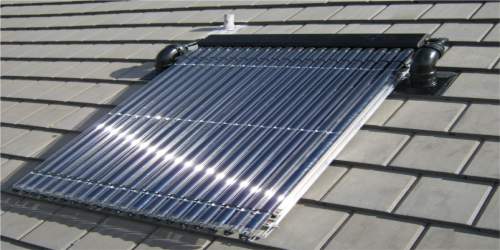Read Time : 2 Minutes
Financial Benefits of Solar Thermal Systems
The Renewable Heat Incentive (RHI) closed to new applicants on 31st March 2021. Please click this link for up-to date information.
Aside from reducing your carbon footprint and saving on energy bills, there are significant financial incentives available to those looking to install renewable energy technologies.
Will installing a solar thermal collector affect my property price?
There is still little conclusive evidence to suggest that the presence of a solar thermal system impacts positively or negatively on a property’s value. However, the ability to produce hot water in a cheap and environmentally friendly manner and receive money for doing so (through the RHI) is bound to be attractive to potential buyers. The limited aesthetic impact of solar thermal collectors is also a positive factor.
The value placed on the solar water heating system by the perspective buyer is likely to rise in the future as people become more educated as to the benefits of this technology. For business premises, the presence of renewable energy technology is likely to be appreciated by customers.
It should be noted, that many solar thermal collectors have some degree of portability and can be moved to a new property if you’re moving house or if the new owner doesn’t want them. The study below about the effect of solar PV systems on property price may be of interest to some who are looking for further info on this topic.
Ben Hoen et al, An Analysis of the Effects of Residential Photovoltaic Energy Systems on Home Sales Prices in California, Ernesto Orlando Lawrence Berkeley National Laboratory, April 2011.
COMPARE PRICES FROM LOCAL INSTALLERS
Compare prices from local companies fast & free
Enter your postcode to compare quotes from leading professionals. We promise to keep your information Safe & Secure. Privacy Policy
The Renewable Heat Incentive (RHI) is another Department for Energy and Climate Change (DECC) initiative which allows those who choose to install renewable heat sources in their home or business property to receive payment (paid quarterly) per kilowatt hour (kWh) of heat produced and used.
The RHI has two phases:
- Phase 1 - RHI payments for heat produced in non-domestic installations (i.e. those in businesses, industry and the public sector). This phase is currently in effect and is open for applications.
- Phase 2 - payments for heat produced by domestic installations.
The current tariff for the non-domestic RHI is as follows:
Solar thermal collectors >200kWth
The NEW domestic RHI is as follows:
Solar thermal collectors >200kWth
The non-domestic tariff is guaranteed or ‘locked in’ for a period of 7 years. The domestic RHI tariff is also run on this same model.
In order to be eligible for RHI tariff payments, the property must satisfy the above conditions. Moreover, the installation must be carried out by a Microgeneration Certification Scheme (MCS) accredited installer, who will also install a generation meter.
For more information on non-domestic RHI and the full conditions of eligibility, see the energy regulator Ofgem’s website.
Find a local installer
Welcome to the biggest directory of UK renewable energy companies





 How do Solar Thermal Panels work
How do Solar Thermal Panels work






